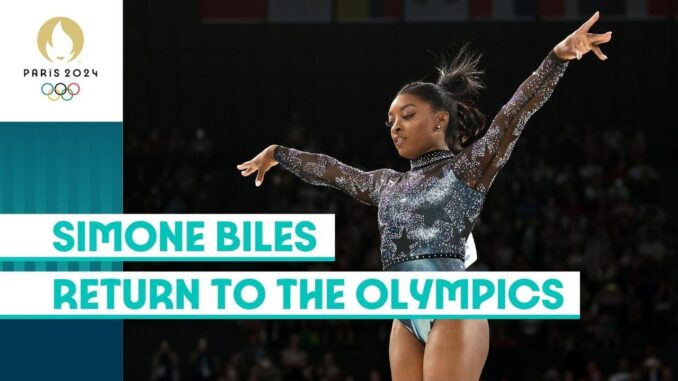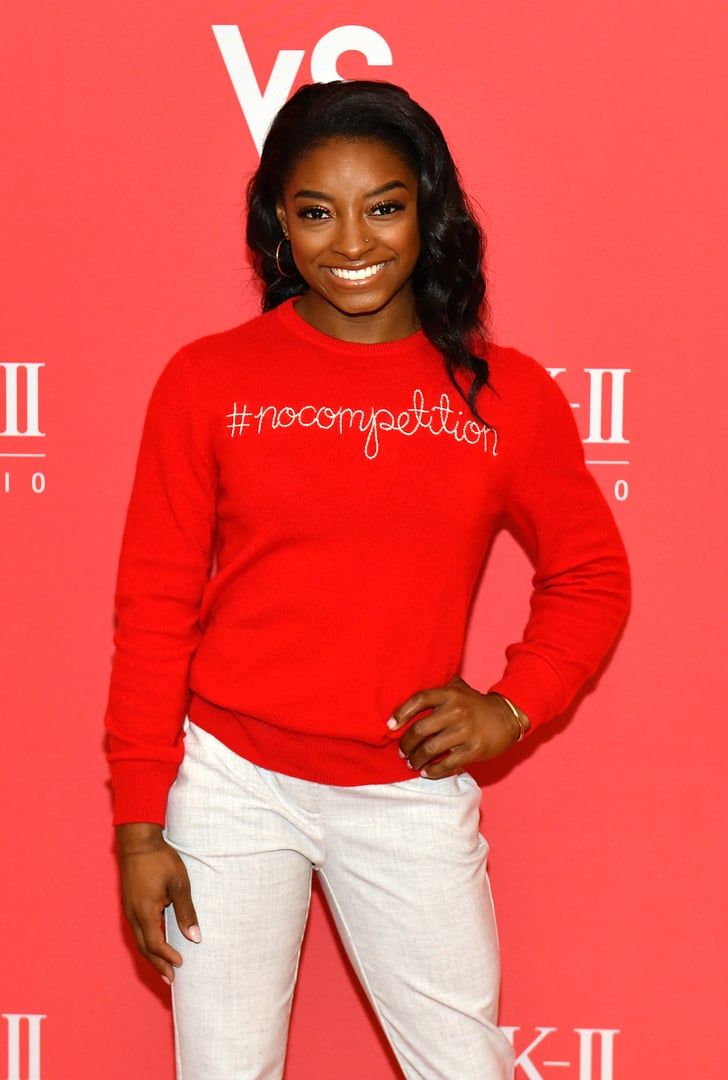
Former American gymnast MyKayla Skinner recently shared her thoughts on her public feud with Simone Biles, stating that it was an extremely emotional situation for her. Earlier in June, Skinner accused Biles of bullying and belittling her teammates on the United States team and stating that she had kept quiet about it for the sake of the other athletes.
What Did MyKayla Skinner Say About Her Feud with Simone Biles?
Skinner stated that the entire situation took a toll on her emotionally due to the online criticism she received. In an interview with FOX News, she said that she and her manager received death threats:
“Everyone just says their opinions online, and they don’t care. That was really hard to take, I was getting death threats. My agent at the time was getting death threats and emails sent to her, and they were actually contacting her phone and sending her voice messages and trying to call her. It was just people that were telling me I was a bad mom, and I don’t have a voice. It really did take me down a spiral and I felt like I couldn’t be a mom that I needed to be for my daughter, which was really difficult.”
The Skinner and Biles feud became public during the Paris Olympics, with Skinner stating that the US National team lacked “work ethic”. Biles performed impressively in Paris, winning a team gold medal as well as two individual gold medals in the vault and all-around events, respectively.
Skinner previously accused Biles of bullying teammates on the US team and also showed her support for political activist Riley Gaines when she was caught in a feud with Biles as well. In an interview on FOX News, Skinner said: “Well, throughout my career, there’s been many times where I have been belittled and bullied by Simone and have wanted to keep quiet for the other athletes. And there’s just been many times through my Olympic journey and through camps, training, everything that we have gone through, have been multiple times where she has come and belittled all of us, and I’ve wanted to stay silent through this because she has a huge platform.”
Skinner and Biles competed together on many occasions, including at the 2014 World Championships and the Rio 2016 Olympics. Skinner once stepped in for Biles in the vault event at the Tokyo Olympics, winning a silver medal.
The Unexpected Blow-Up: What Went Down
When former Olympic gymnast MyKayla Skinner publicly criticized the work ethic and depth of the USA Women’s Gymnastics Team ahead of the Paris 2024 Olympics, she thought she was voicing concerns. Instead, she triggered a media firestorm, a social media war — and as she now reveals — even death threats. According to her statements, not only she but her manager was subjected to harassing messages and threats of physical harm.
This article takes you through the timeline, the root causes, the emotional fallout and the wider implications — all through Skinner’s own revealing perspective.
The Original Comments That Lit the Fuse
Critique of Work Ethic and Depth
In a now-deleted video, Skinner said: “Besides Simone, I feel like the talent and the depth just isn’t like what it used to be… Obviously a lot of girls don’t work as hard.”
She also pointed to what she perceived as stricter oversight by the U.S. Center for Safe Sport, claiming it hampered coaches’ ability to push athletes.
The Trigger: Team USA’s Gold & Simone Biles’ Response
After the Team USA women’s gymnastics team captured gold at Paris 2024, Simone Biles posted a celebratory Instagram photo with the caption: “lack of talent, lazy, Olympic champions.” Though not naming Skinner, many interpreted it as a direct jab at her remarks.
This post acted as the flashpoint for the explosion of online criticism aimed at Skinner.
The Social Media Snowball
Once the remarks and the post went viral, the backlash began. Skinner said that comments, direct messages, emails and even voice messages poured in — many of them threatening or hateful in nature.
The Scope of Harassment: What She Says Happened
Death Threats to Skinner, Her Family & Manager
Skinner detailed that “my agent at the time was getting death threats and emails sent to her, and they were actually contacting her phone and sending her voice messages.”
Further, she said threats extended to her husband and infant daughter — a level of harassment no athlete expects.
The Emotional Fallout: Feeling Silenced and Unsafe
She frankly admitted to going “down a spiral” emotionally: “It was really hard to go through and I felt like I couldn’t be the mom that I needed to be for my daughter.”
The sense of being under siege, the feeling that any public voice could provoke danger, is a chilling side of fame many don’t see.
A Plea for Help — Publicly Directed at Biles
In August 2024 Skinner posted a video publicly calling on Biles: “Please ask your followers to stop.” She said the violence of the harassment was assembled in part because of Biles’ influential platform.
Why the Feud Mattered: Beyond Two Athletes
A Microcosm of Larger Gymnastics Tensions
The controversy tapped into deeper issues in gymnastics: legacy versus new generation, criticism of work ethic, the role of SafeSport reforms, athlete mental health. Skinner’s comments pointed to what she saw as decline in intensity.
Meanwhile, Biles’ response illustrated how platform and reputation matter in an era of social-media sport.
The Role of Social Media in Amplifying Conflict
What might once have been a closed locker-room conflict instead played out globally. A post, a caption, a deleted video — and suddenly thousands of strangers feel entitled to weigh in, harass, threaten.
The Fragile Balance Between Critique and Bullying
Skinner believed she was making a constructive critique; many saw it as disrespect toward teammates. The difference? In this digital age, intention rarely determines reaction. The combination of controversy, social media momentum and emotion escalated into toxicity.
Skinner’s Epiphany: How She Responded and What She Learned
Owning Her Voice — and Her Apology
Skinner admitted she “poorly articulated the point I was trying to make.” She offered apologies to her former teammates and attempted to clarify her intent.
Asking for a Truce, Asking for Respect
Her public video wasn’t just about personal anguish — it called for empathy. She said: “Let’s use this time to build each other up, not tear others down.”
The Opportunity for Growth
Rather than retreat entirely, Skinner’s ordeal may become a turning point: a chance to speak about mental health, the cost of public commentary, the responsibilities of influence. It’s raw. It’s human. It matters.
The Role of the Manager: Secondary Target, Primary Concern
Agents in the Crossfire
Often overlooked, athlete representatives can become collateral damage. Skinner’s manager reportedly received voice messages, calls, threats targeting her because of Skinner’s post-feud visibility.
Why It Matters
When threats reach beyond the athlete to their team, the echo is louder. It affects trust, support systems, career decisions and wellbeing. Managers are meant to protect, yet here became additional targets.
The Protection Gap
This situation underscores a gap: while athletes face policies and safeguarding, their entourages often have no formal protection mechanism. Harassment toward support staff remains under-acknowledged.
Inside the Athlete’s Mind: Pressure, Legacy & Identity
The Weight of Olympic Expectations
Competing at the Olympics is uniquely high-stakes. Comments on “work ethic” or “talent” carry more weight than they might elsewhere. For Skinner, a former silver medalist and past alternate, her view came from experience.
Identity After Competition
Like many retired or semi-retired athletes, Skinner’s identity may still be wrapped in performance, representation, commentary. When she spoke out, she wasn’t just a former gym-nast — she was still part of the ecosystem.
The Cost of Speaking Up
Speak up: risk alienation. Stay silent: suppress voice. Skinner confronted both. She paid a steep emotional price for exercising her voice, with consequences far beyond the gym.
Lessons for Sports, Social Media & Society
Words Carry Weight — Especially in Public Arenas
A comment about “depth” and “work ethic” may seem harmless internally, but in the public realm, it gets magnified. Athletes must consider how statements will land and evolve.
Platforms Breed Amplification
Instagram, YouTube, DMs — all accelerants of the story. Skinner’s deleted video, Biles’ caption, followers’ reactions: the mix became volatile.
Harassment Doesn’t Stop at the Athlete
Threats to Skinner’s manager and family show the ripple effect. This isn’t just an athlete’s problem—it’s a broader ecosystem problem.
Mental Health Isn’t an Add-On, It’s Central
Skinner’s admission of spiraling, feeling unable to be the mom she wanted to be, shows mental health is not optional. It’s front and center in athlete narratives now.
Accountability and Repair Matter
She apologized. She reached out. She asked for help. That matters. It doesn’t erase the moment — but it shows growth.
What Happens Next for Skinner & the Gymnastics Community
The Path for Skinner
Moving forward, Skinner appears invested in advocacy — using experience to raise awareness. Her voice will likely be valued not just for her talent, but for her trial.

For Team USA and Gymnastics
This entire episode could prompt deeper conversation: how athletes talk, how former athletes critique, how platforms amplify conflict. It might stimulate policy review or internal team communication re-thinking.
Social Media Strategy for Olympians
The episode is a case study in what can go wrong when former athletes use public platforms. Future athletes will benefit from lessons learned here: clarity of statement, awareness of reach, recognition of consequences.
Final Thought: The Human Behind the Headlines
Amid the medals, the media, the glare, lies a woman grappling with motherhood, legacy and a digital storm. MyKayla Skinner’s story forces us to remember that athletes are human. They make statements, they regret mis-steps, they suffer unseen costs. And in a world amplified by social media, one misphrased video and one ambiguous caption can spiral into threats and trauma.
Her call for empathy — for respect — is more than a PR move. It’s a remembrance that in sport, as in life, connection and kindness should matter just as much as competition and criticism.
Conclusion
The feud between MyKayla Skinner and Simone Biles wasn’t just about two athletes and a viral Instagram caption. It was about power, platform, legacy and vulnerability. When Skinner voiced what she believed to be a critique, the reaction morphed into something far bigger — something frightening. Death threats. Manager harassment. Emotional trauma. What emerges is a story not only of fallout, but of learning. Of accountability. Of the reality that sports — especially high-profile sports — walk hand-in-hand with social responsibility, mental health, and digital citizenship. Skinner’s openness about her experience can help others understand the cost of comment, the danger of harassment, and the value of voice used responsibly.